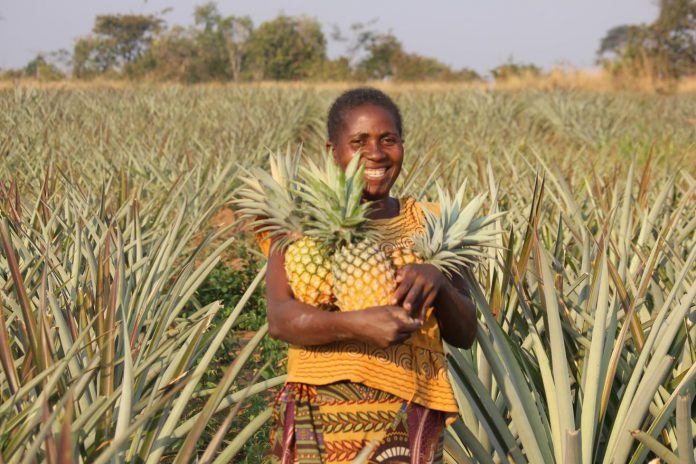Profits soar for Ikelen’ge pineapple farmers
By Gift Chanda, Communications Officer
In the scorching sun, Betty Sameta, 46 keeps an eye on her fields of pineapples growing near the banks of the Chinyazhi River in Ikelenge district, one of the major producing areas of the fruit in Zambia.
 |
| Betty Sameta in her 25 hectare pineapple field |
Her pineapple field stretches 25 hectares and last year she managed to harvest tonnes of the fruit, earning her K20, 000, the highest she has ever earned since she started growing the crop 18 years ago. The mother of three used part of the income to pay for her children’s school fees and the rest to start building a modern house.
“I am hoping to harvest more pineapples this year since we have a more reliable market this time around,” she says, referring to a factory recently established by Zambezi Pineapples Limited with the support from Musika.
The factory produces dried fruit and fresh juice from pineapples it buys from smallholder producers such as Betty in Ikelengi district, where it is head quartered, and also Mwinilunga District.
Before Zambezi Pineapples Limited put up the factory, producers would struggle to market their pineapples, with nearly 80 percent of the crop going to waste, Betty narrated.
“There was no stable market and there was nothing we could do to prevent the pineapples from going to waste” she explained.
Betty and her fellow producers would rely on traders from the Copperbelt and Lusaka who were exploiting them, buying a pineapple at K1 and reselling at K15 each.
It was a total loss but we had no choice because if you didn’t sell them, it meant you will not salvage anything from the entire harvest,” she narrated.
To avoid further losses, Musika in 2015 supported Zambezi Pineapples establish a pineapple fruit processing facility that was non-existent since the original factory closed almost 25 years ago.
“It has been a relief to finally have the plant. Already this year I have sold pineapples worth K16, 000 in just one
month,” Betty said, blazing with pride at the revelation.
Musika supported by financing the procurement of components of the processing equipment, and logistical support for the company’s outreach staff to provide extension services and promote the adoption of productivity-enhancing practices in order to improve the quality of the pineapples and stimulate increased production.
The factory has not only created a market for producers who previously didn’t have the market to sell their pineapples but also encouraged them to start expanding their fields, according to Davis Ikayi, the factory’s production manager.
Betty’s brother-in-law, Silvin Sameta, who also cultivated a 15-hectare pineapple field, plans to double the size of his field this year after he supplied K20, 000 worth of pineapples to Zambezi Pineapples factory last year. From the time the plant was established, the number of farmers supplying the fruit has risen to 600.
 |
| Silvin Sameta in his 15 hectare pineapple field |
“We receive calls all the time from farmers asking us to go and pick up the pineapples, unfortunately we are only able to buy 5000 pineapples per week,” Denson Kajinga, the company’s purchasing officer, said.
Initially, Zambezi Pineapples was only processing dry fruit but with additional funding from Musika, the company in 2016 invested fully in juice processing, a move that has presented the potential to scale up the number of smallholders to 1,200 supplying over 1,700 tonnes of pineapples to meet the estimated demand volumes per week.
Apart from supplying the pineapple products through formal markets such as convenience stores and supermarket chains, Zambezi Pineapples has specifically targeted the mass market in urban areas for the pineapple juice, giving a business and employment opportunity to approximately 400 mostly women traders and retailers, and local kiosks in North- Western Province.
The factory has also created 15 direct jobs for members of the local community in Ikelengi among them are eight females trained as semi-skilled processing technicians.
 |
| Part of the pineapples processing process |

